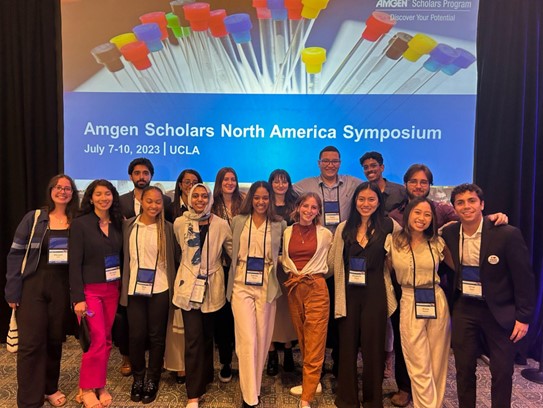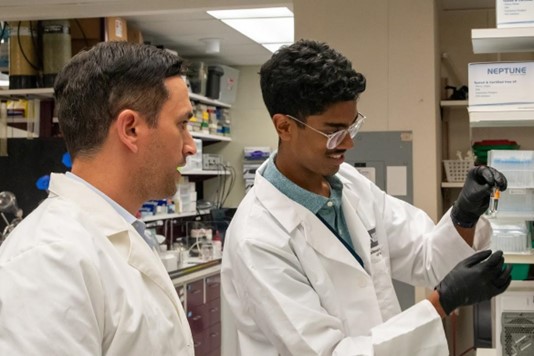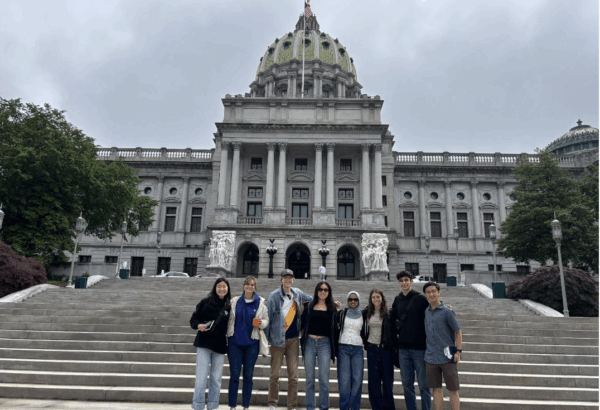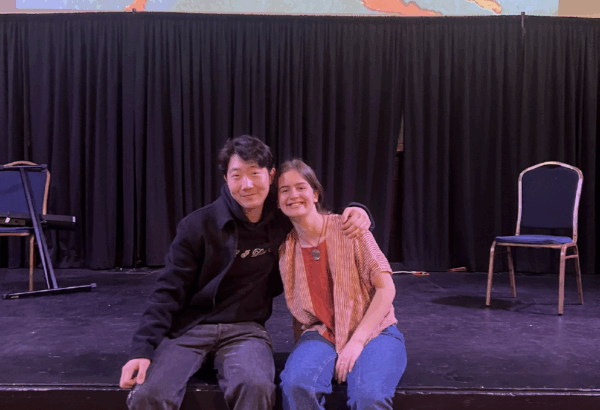Practicing Mindfulness and Gratitude at the Lab Bench
This summer, I was encouraged by SNF Paideia’s Wellness and Student Advising Director, Dr. Lia Howard, to keep a weekly journal throughout my time as an Amgen Scholar at the National Institutes of Health in Bethesda, Maryland. Honestly, as someone unfamiliar with, but who always wanted to try journaling, it took me a while to figure out how exactly to translate my thoughts onto paper in a way that captured the summer’s experiences and their effect on my future trajectory. We eventually settled on letters, a more natural form of communication that precipitated the writing of this blog post. I’m grateful for that initial suggestion from Dr. Howard, as with the help of this summer’s journal, I’m now able to take full measure of just how transformative an opportunity it was and to share my lessons learned.
Over the past two months, I worked on a cancer immunotherapy project at the NIH Clinical Center (CC) under the guidance of Dr. Bradford Wood, the founding Director of the NIH Center for Interventional Oncology (CIO). Similar to Penn, the NIH loves acronyms. I was joining a cohort of 15 other Amgen Scholars at the NIH from all across the country, all of whom had their own research assignments spanning the 27 institutes and centers encompassed by the NIH. My project with the Wood Lab was focused on the characterizing of loading and delivery of anti-angiogenic and small-checkpoint inhibitor drugs in drug-eluting microspheres, microscopic polymer beads that are imageable on CT. These beads are used in transarterial embolization, a novel treatment for late-stage liver and kidney cancers that utilizes catheterization to deliver therapeutic agents locally to a tumor, reducing systemic toxicity or unintended drug exposure throughout the body, a considerable problem for some chemotherapy drugs. If those last two sentences didn’t make complete sense to you, you might take solace in the fact that it took me two weeks to understand just what exactly I would be doing this summer. I can tell you, however, that this area of research is crucial in developing successful minimally-invasive treatments for late-stage and aggressive cancers so these patients, usually belonging to racial minorities and of lower socioeconomic status, might live a little longer with a little less pain, and that’s why we should care about it.
I have a strong science background thanks to my STEM coursework at Penn but am by no means a bioengineer or material scientist, so I understandably entered the lab with a degree of apprehensiveness. By the end of the summer, however, I felt as though I could talk about my project for hours (which I was in fact required to do at the NIH’s Student Poster Day) and I think that is due mainly to my mentor. A staff scientist in the Wood Lab, Andrew gave me the independence to run my own experiments while simultaneously always being available for questions, as we checked in multiple times a day. Whereas one might feel intimidated asking questions to those in positions of authority for fear of sounding ignorant, this summer evidenced how a good mentor will help you feel that there are no dumb questions, while encouraging discovery and exploration. While this more hands-off approach might seem counterintuitive to building a solid working relationship, I found that the independence to be intellectually curious actually deepened our conversations and the insights that we shared with one another. It helped me to develop my own sense of appreciation for our research within the context of my own interest in health equity.
The Translating of Translational Research to Policy
Amgen, a biotechnology company with an adjoined foundation arm dedicated to increasing science education and pathways to research, sponsors summer research at 13 top research institutions across the United States, with each campus having a specialized focus. As an Amgen Scholar at the NIH, the only non-university Amgen site, I participated in a subprogram-specific curriculum focused on health disparities and health policy, which, as a Health and Societies major, was truthfully the primary reason I applied for the program. Our main assignment was writing a policy brief related to the field of study we were working in this summer. Thus, I wrote to the HHS Office of Minority Health to encourage the creation of a grant program related to a hepatitis C (HCV) elimination campaign, as HCV is a strong precursor for liver cancer. HCV is also one of the most well-defined health disparities in the 21st century, predominantly impacting poorer Black Americans in the rural South. In truth, the assignment came to me quite naturally, thanks to my major but also because of my research from the prior summer with the Penn Leonard Davis Institute (LDI) on health equity units in all 50 states and the role HHS OMH played in creating them.
This background of mine allowed me to assist my peers in the cohort in thinking about how to relate their research to a specific and tangible policy goal. The discussion would go something like this: “Your research is on this specific type of cancer. What kind of health behaviors might increase someone’s risk of developing this illness?” My next question would be, “Which populations are most likely to engage in these behaviors? What interventions or support systems could be put in place to mitigate these risks?” This kind of 30,000-foot view approach, which allows you to pinpoint structural and social barriers to health that are typically imperceptible at the lab bench, is something I had previously taken for granted as a result of my coursework and previous health-services research experience. In a way, taking a humanities approach to basic science, as I would like to call it, allows you to remember why you are doing the research you are doing. And in the face of failure, such a sense of purpose is paramount.
As you might be able to tell, science communication was a predominant theme of the summer. Thanks to the generous support of the Paideia program and the LDI, I also had the opportunity to present an original research poster on my characterization of the health equity unit landscape from the previous summer at the Academy Health Annual Research Meeting (ARM), the largest yearly gathering of health services researchers in North America. While it required a little juggling of different parts of my brain switching between discussing health policy at ARM in Seattle and then describing the immunological and oncological aspects of my drug delivery research with the other North American Amgen Scholars at our symposium at UCLA, it also challenged me to be curious about the continuities between the two disciplines. When I think of the direction this summer has inspired me to move in, it is in that of further discovery of this overlap. Drug discovery cannot exist without policy because it’s how we actualize the connection between patients and care, and crucial to this relationship is the dissemination of scientific findings. For me, the possibility of a future profession integrating clinical research and policy could not be more exciting, and if the current state of American health care is any indication, could not be more necessary.
Investing in the R&D of Yourself
Whether your research is on beta-barrel membrane proteins in mitochondria or comparing the impact of different Medicare plans on health equity metrics, our society has an ever-changing relationship with scientific inquiry that requires aspiring academics to be generalists, in a sense. As esteemed scientist and communicator, Dr. Giles Yeo, shared with us at the Amgen Scholars Symposium, that being able to understand the applications of the studies with which you are engaged for non-expert populations and to communicate those applications to those not directly within your scholarly community, is necessary for building trust and cementing the reach of your findings. Having a supportive research mentor helps in this process of professional development as they possess the foresight their experience obliges them which can assist in making those throughlines a little more clear.
The SNF Paideia program has been preparing me for such a career all along, as it attracts students with seemingly juxtaposed interests, like public policy and basic science research, and cultivates within them the mindset to be able to value and comprehend that which lies at the intersection: basic tenets of our society like wellness, citizenship, and dialogue. Research is used as a catchall term and can be reductive in describing the vast expanse of work being done across multiple disciplines. What this means is that you might not always see your niche well-established in an academic department or research center, but the space is plentiful for you to carve your own path, and if in the right environment, as I found this summer, there will be countless mentors and peers to inspire and help you along the way. In a world where the questions we can ask and try to answer are endless, why choose just one?





